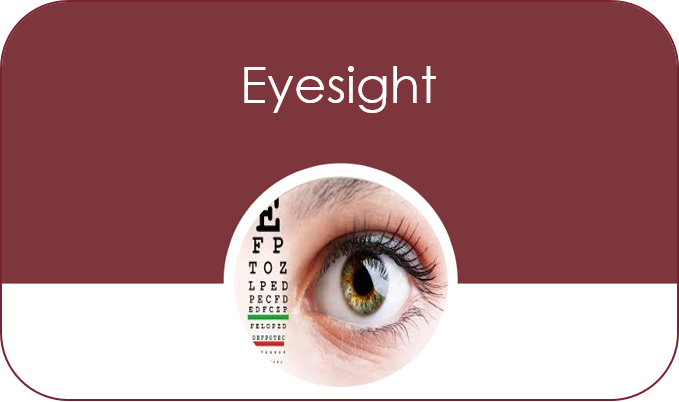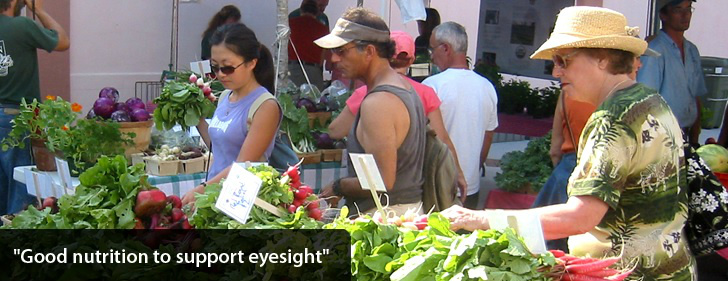Eye Nutrients
Nutrition is one of the only areas were somebody can take action to help avoid eye health problems. If you take control of this area of your life you can significantly reduce the risk of having poor eyesight or even going blind.
The following are a list of vitamins and nutrients that are vital to the eye. And always remember when it comes to nutrient absorption in your body, natural unprocessed foods are better than supplements, and raw is better than cooked.
1. Zinc
Zinc is an element very much associated with protein foods. However it may be consumed from a number of vegetarian sources.
Source: The following foods have an abundance of zinc Oysters, beef, crab, pork, lobster, baked beans, cashews (raw), yogurt, chickpeas, kidney beans, peas, porridge, flounder and sole.
Benefit: Works in conjunction with vitamin A to reduce night blindness, may help reduce the risk of AMD.
2. Vitamin A
Vitamin A is one of the key vitamins that we hear so much about.
Source: Liver, egg, milk, cheddar cheese, dandelion greens, carrots, broccoli , sweet potato, butter, kale, spinach, pumpkin, collard greens, cantaloupe melon, apricot, papaya, mango and peas.
Benefit: May protect and improve dry eyes and night blindness.
3. Vitamin C
Another key vitamin
Source: Calf liver, Beef, Oysters, Pork, Chicken liver, Red pepper, Broccoli, Brussels sprouts, Kale, Lemon, Cauliflower, Garlic, Grapefruit, Raspberry, Oranges, Tangerine, Spinach, Cabbage, Potatoes, Tomato, Grapes, Bananas, Carrot and Avocado.
Benefit: Decreases the risk of cataracts and night blindness.
4. Vitamin D
Another key vitamin
Source: Milk, Sardines, Salmon and Mackerel. Sunshine on your skin increases formation of Vitamin D.
Benefit: Risk of developing macular degeneration reduced significantly.
5. Vitamin E
Another key vitamin
Sources: Avocados, Almonds, Asparagus, Kiwifruit, Broccoli, Pumpkin, Sweet potato, Mangoes, Tomatoes, Rockfish and Papayas.
Benefit: When consumed in conjunction with vitamin C and carotenoids may reduce the risk of advanced macular degeneration.
6. Bioflavonids
Bioflavonids come from the latin term flavus meaning yellow (which is their colour in nature). They are essential in eye health
Source:Tea (Green tea), Wine and dark chocolate.
Benefit: May reduce risk of macular degeneration and cataracts
7. Beta-carotene
As it name implies this mineral is mainly derived from carrots!
Source: Carrots, spinach, kale and sweet potatoes.
8. Omega-3 Fatty Acids
These are the famous “omega-3 fats” and they are absolutely essential for the eyes.
Source: Ground flaxseed, cold water fish (salmon, mackeral,trout etc), flax oil and hemp oil.
Benefit: Reduce or eliminate dry eyes and macular degeneration.
9. Selenium
Important mineral
Source: Brown rice, salmon, shrimp, crab and halibut.
Benefit: Works in conjunction with other vitamins and minerals to reduce the risk of macular degeneration.
10. Zeaxanthin and Lutein
Two key nutrients.
Source: Spinach, collard greens, dandelion leaf, rocket and squash.
Benefit: Reduce risk of macular degeneration and cataracts.
The following are a list of vitamins and nutrients that are vital to the eye. And always remember when it comes to nutrient absorption in your body, natural unprocessed foods are better than supplements, and raw is better than cooked.
1. Zinc
Zinc is an element very much associated with protein foods. However it may be consumed from a number of vegetarian sources.
Source: The following foods have an abundance of zinc Oysters, beef, crab, pork, lobster, baked beans, cashews (raw), yogurt, chickpeas, kidney beans, peas, porridge, flounder and sole.
Benefit: Works in conjunction with vitamin A to reduce night blindness, may help reduce the risk of AMD.
2. Vitamin A
Vitamin A is one of the key vitamins that we hear so much about.
Source: Liver, egg, milk, cheddar cheese, dandelion greens, carrots, broccoli , sweet potato, butter, kale, spinach, pumpkin, collard greens, cantaloupe melon, apricot, papaya, mango and peas.
Benefit: May protect and improve dry eyes and night blindness.
3. Vitamin C
Another key vitamin
Source: Calf liver, Beef, Oysters, Pork, Chicken liver, Red pepper, Broccoli, Brussels sprouts, Kale, Lemon, Cauliflower, Garlic, Grapefruit, Raspberry, Oranges, Tangerine, Spinach, Cabbage, Potatoes, Tomato, Grapes, Bananas, Carrot and Avocado.
Benefit: Decreases the risk of cataracts and night blindness.
4. Vitamin D
Another key vitamin
Source: Milk, Sardines, Salmon and Mackerel. Sunshine on your skin increases formation of Vitamin D.
Benefit: Risk of developing macular degeneration reduced significantly.
5. Vitamin E
Another key vitamin
Sources: Avocados, Almonds, Asparagus, Kiwifruit, Broccoli, Pumpkin, Sweet potato, Mangoes, Tomatoes, Rockfish and Papayas.
Benefit: When consumed in conjunction with vitamin C and carotenoids may reduce the risk of advanced macular degeneration.
6. Bioflavonids
Bioflavonids come from the latin term flavus meaning yellow (which is their colour in nature). They are essential in eye health
Source:Tea (Green tea), Wine and dark chocolate.
Benefit: May reduce risk of macular degeneration and cataracts
7. Beta-carotene
As it name implies this mineral is mainly derived from carrots!
Source: Carrots, spinach, kale and sweet potatoes.
8. Omega-3 Fatty Acids
These are the famous “omega-3 fats” and they are absolutely essential for the eyes.
Source: Ground flaxseed, cold water fish (salmon, mackeral,trout etc), flax oil and hemp oil.
Benefit: Reduce or eliminate dry eyes and macular degeneration.
9. Selenium
Important mineral
Source: Brown rice, salmon, shrimp, crab and halibut.
Benefit: Works in conjunction with other vitamins and minerals to reduce the risk of macular degeneration.
10. Zeaxanthin and Lutein
Two key nutrients.
Source: Spinach, collard greens, dandelion leaf, rocket and squash.
Benefit: Reduce risk of macular degeneration and cataracts.




